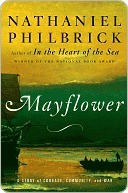More on this book
Community
Kindle Notes & Highlights
Read between
December 28, 2020 - January 14, 2021
Due to the notoriously bad quality of the drinking water in seventeenth-century England, beer was considered essential to a healthy diet.
As Separatists, they considered themselves godly exceptions to the vast, unredeemed majority of humankind. A sense of exclusivity was fundamental to how they perceived themselves in the world.
Robinson had anticipated the need to create a government based on civil consent rather than divine decree.
They must “become a body politic, using amongst yourselves civil government,” i.e., they must all agree to submit to the laws drawn up by their duly elected officials.
Even though the Indians had been required to lay down their bows, the Pilgrims continued to carry their muskets—a clear violation of the treaty they had just signed with Massasoit.
Unlike the Europeans, who relied on large stores of provisions, the Native Americans tended to follow the food wherever it might be seasonally available,
Huddled in swamps and on remote islands, fearful that to venture back to their villages meant certain death, Indians throughout the region were unable to plant the crops on which their lives depended.
Standish’s raid had irreparably damaged the human ecology of the region. Not only had the Pilgrims proved unexpectedly violent and vindictive, but Massasoit had betrayed his former confederates.
In April, Bradford had decided that each household should be assigned its own plot to cultivate, with the understanding that each family kept whatever it grew. The change in attitude was stunning. Families were now willing to work much harder than they had ever worked before. In previous years, the men had tended the fields while the women tended the children at home. “The women now went willingly into the field,” Bradford wrote, “and took their little ones with them to set corn.” The Pilgrims had stumbled on the power of capitalism. Although the fortunes of the colony still teetered
...more
The Pilgrims believed that since no Indians were presently living on the land, it was legally theirs. “[I]t is lawful now to take a land which none useth,” Robert Cushman wrote, “and make use of it.”
For Bradford, land had been a way to create a community of Saints. For an increasing number of Pilgrims and especially for their children, land was a way to get rich.
The Pilgrims had done little to convert the Indians to Christianity, but for the Puritans of Massachusetts it was, or so they told themselves, a priority from the start.
By the 1660s, the English no longer felt that their survival depended on the support of the Indians; instead, many colonists, particularly the younger ones, saw the Indians as an impediment to their future prosperity.
soldiers still possessed matchlocks and pikes—weapons that soon proved completely ineffective in fighting an enemy that refused to meet them in the open field.
Selling Indian captives served two functions: it provided income to help pay for the war, and it removed a dangerous and disruptive people from the colony—not
“To sell souls for money seems a dangerous merchandise,” Eliot wrote.
Inevitably, the Pilgrims came to be known not as they had truly
been but as those of the Victorian-era wished them to have been.
In the American popular imagination, the nation’s history began with the Pilgrims and then leapfrogged more than 150 years to Lexington and Concord and the Revolution.


